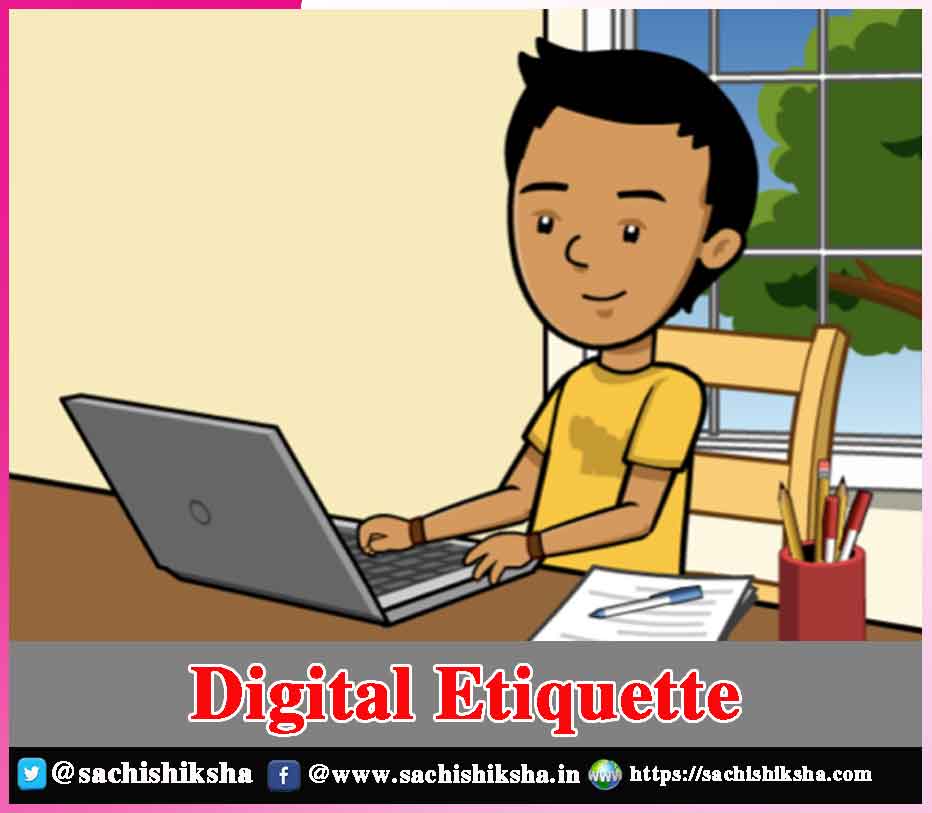Digital Etiquette
Introduction: We live in a world which is more or less becoming digitized. With nations developing systems and promoting internet based working, the world is definitely transitioning into a technology driven place.
With the advent of the internet and all activities being carried on through the internet, there comes a need to check the spread of uncontrolled and deleterious penetration of the digital space.
Digital etiquette has become an important aspect of promoting a good net order to avoid any harm to the consumers of the internet. This etiquette makes sure that all actions on the internet are carried out as per the code of conduct and community guidelines. The world is connected through the internet. Digital etiquette means building these connections and sustaining connections with courtesy and respect.
Also Read :-
Table of Contents
Several Core Principles:

- Avoid language that may hurt sentimental feelings and come across as strong or offensive.
- Read first, write later.
- Review and then send.
- Follow the community guidelines of the platform being used.
- Know the language of the Internet.
- Consider the privacy of others and do not breach their right to privacy.
- Do not send, forward, or post inappropriate material.
- Do not violate the dignity of a woman by any derogatory and disrespectful action.
- The use of the internet should be such that it is a child friendly space.
Cyber Terrorism:
With digital penetration and digitization taking place at a very large pace new forms of crimes are being resorted to by target groups to fulfill their interests and inflict harm to the vulnerable groups. Cyber terrorism and cyber warfare is one such example. Terror outfits are using cyber attacks and cyber wars as a mode to spread their agenda and commit humanitarian violations to civilians in countries like Yemen, Syria, Sudan etc.
Cyber Bullying:
Cyber bullying is another method adopted by people to use it against the ones they want to target. It is deplorable and unwelcomed. It is harassment using electronic means. It has become increasingly common, especially among teenagers, as the digital sphere has expanded and technology has advanced. This is the biggest con of the internet as a lot of teenagers get into problems and end up having self esteem issues. A lot of children feel situated in problems that they think cannot be solved in that scenario and even end up committing suicide.
Negative Effects of Cyber Bullying:
According to UNICEF, when the bullying takes place online, it can result in unwanted attention from a wide range of people including strangers. Wherever it may happen, if you are not happy about it, you should not have to stand for it. It can seem like there’s no escape. The effects can last a long time and affect a person in many ways:
- Mentally – feeling upset, embarrassed, even afraid or angry.
- Emotionally – feeling ashamed or losing interest in the things you love and emotionally drained and exhausted.
- Physically – tired (loss of sleep), or experiencing symptoms like stomach aches and headaches.
Hacking & Data Theft:
Today, we are also prone to many attacks in the form of hacking and data theft. Terrorists and enemy states employ these unlawful means to steal useful information from other countries. It may be in the form of malwares, Trojans etc. The recent AIIMS data theft is an example. It poses a great threat to the security and privacy of the people. For this the government is taking steps through IT Act, Draft Personal Data Protection Bill etc.
Follow Internet Manners:
Digital etiquette is also called internet manners. Since online conversations or online engagement does not involve face to face conversations the tone of the other person is not clear. It may hurt the sentiments of the other person, hence it becomes a responsibility to ensure that conversations and engagements are done as politely as possible.
Threatening or bullying someone and sharing obscene material without the other person’s consent is against the etiquette. There is a lot of obscene material floating on websites that are also accessible by children. Such material should be put down and such websites should be banned. Technology should not be used to humiliate, hurt, cheat or to do frauds with other people. Hostile and flaming interactions are also against internet manners.
Uphold a Peaceful Digital World:
We are all aware of the fact that pictures on public accounts especially those of celebrities, actors, actresses, politicians garner a lot of hate comments and unsolicited words. Such comments must be abstained from doing, because these comments are against digital etiquettes and also may hurt the sentiments of the other person. Hence, it must be ensured to uphold a peaceful internet and good digital world.
Spread Digital Literacy:
If we do not agree with someone’s point of view or opinion we should simply abstain from commenting on it rather than writing hurtful comments or abusing the other person. With that, photos of people should not be posted without permission. Hence, their privacy should be respected. Manners and common sense should be practiced while conversing on the internet. With that, the most important thing is spreading digital literacy and ensuring that students and children are taught about internet manners in school by their teachers and parents.
Compare Online & Offline Etiquette:
Young students can learn how to show respect when online, by exploring the similarities and differences between face-to-face and online communication. They can learn some rules that will help them to be respectful and take responsibility for their actions when offline and online. They can examine online etiquette and compare this with offline etiquette to identify what is appropriate and inappropriate.
Conclusion:
Hence, with the Internet penetrating the remotest areas through developments in technology, one must not only encourage digitization of the world but also responsible digital behavior and a code of conduct that must be followed by every one in order to encourage and ensure a healthy and a peaceful digital world. To make this happen only the government is not responsible but all of us as consumers and users of the internet should take necessary steps in order to tap the benefits of the internet and not face any harm due to it.












































